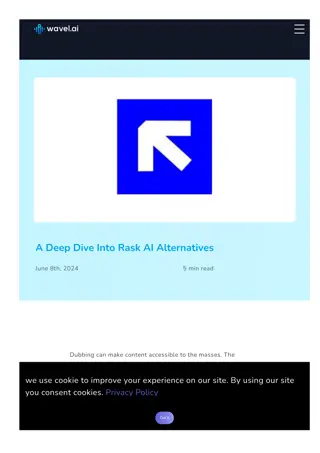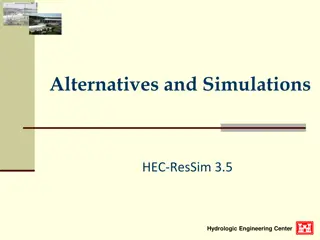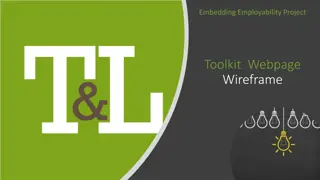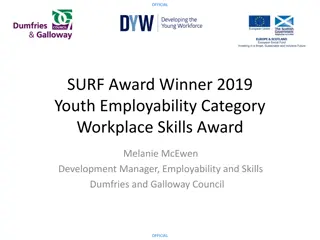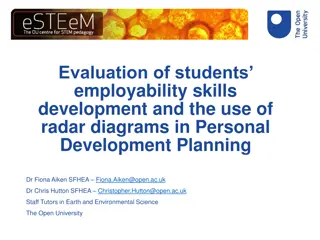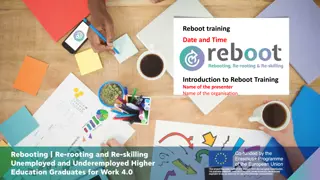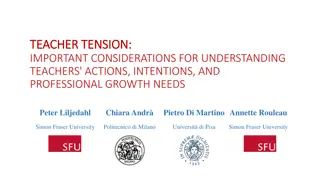Exploring Employability in Higher Education: Tensions, Risks, and Alternatives
This presentation delves into the complex landscape of employability within higher education, examining historical contexts, media influences, global rankings, adoption by supranational organizations and national governments, and the concept and benefits of employability. It emphasizes the importance of a holistic approach to developing graduates' skills, attributes, and understandings for successful employment outcomes.
Download Presentation

Please find below an Image/Link to download the presentation.
The content on the website is provided AS IS for your information and personal use only. It may not be sold, licensed, or shared on other websites without obtaining consent from the author. Download presentation by click this link. If you encounter any issues during the download, it is possible that the publisher has removed the file from their server.
E N D
Presentation Transcript
Employability in higher education: tensions, risks and alternatives Tristan McCowan CGHE seminar UCL Institute of Education, 15 July 2016
Historical emergence of employability Human capital theory Neo- liberalism Knowledge economy
Media hype The skills gap: who should be taking responsibility? (Telegraph (UK), 23/7/15) South Africa's unemployment crisis cripples prospects for young graduates (AfricaNews, 1/7/16] Thousands of graduates working in jobs that don't require any qualifications (Independent (UK), 1/7/16] Skills shortage forces manufacturers to rethink human capital strategy (Business Day, Nigeria, 27/2/14] Uganda's unemployed graduates held back by skills gap [Guardian, 16/1/14]
Global Employability University Ranking 2013 (THE) Rank Institution Country 1 2 3 4 5 Harvard University University of Cambridge University of Oxford California Institute of Technology Yale University USA Great Britain Great Britain USA USA 6 Massachusetts Institute of Technology USA 7 8 9 Stanford University Columbia University Princeton University USA USA USA 10 11 University of Toronto Technische Universit t M nchen Canada Germany 12 The University of Tokyo Japan
Adoption of employability Supranational organisations World Bank; OECD; UNESCO; Bologna process National governments e.g. UK, Australia Institutions e.g. University of the West of England, Robert Gordon University
What is employability? a set of achievements skills, understandings and personal attributes that makes graduates more likely to gain employment and be successful in their chosen occupations, which benefits themselves, the workforce, the community and the economy. (Yorke 2004) N.B. Employability not employment
Conceptualisations Skills Graduate identity Graduate attributes Graduateness
Centre for Entrepreneurial Studies, Federal University of Agriculture, Abeokuta
Employability is a valid aim of the university only as long as it is: 1. Consonant with the central purpose of the university 2. Ethical 3. Efficient 4. Equitable Choosing the rules, or playing within the rules? (Swift 2003)
Value of higher education Intrinsic Instrumental Positional
1. Consonance with the central purpose of the university The elusive essence of the university A tentative principle: the governing purpose [of universities] involves extending human understanding through open-ended enquiry (Collini 2012: 92)
2. Ethics a) How does the promotion of employability affect society? The overall impact of promoting employability on society is debatable, depending on one s moral and political positioning in relation to neoliberal capitalism, i.e. as regards the acceptability of socio-economic inequalities, the value of wealth accumulation and consumption, etc. However, given the rules of the game , there are strong individual interests in developing employability - particularly an expansive rather than a narrow form. b) Does employability promote ethical action in graduates? Caveat: Company-first employability
3. Efficiency What aspects of employability can universities promote? Are there other institutions better placed to do so? Are there any costs? Caveat: Zero-sum game employability
4. Equity Three stages of inequity access student experience outcomes




